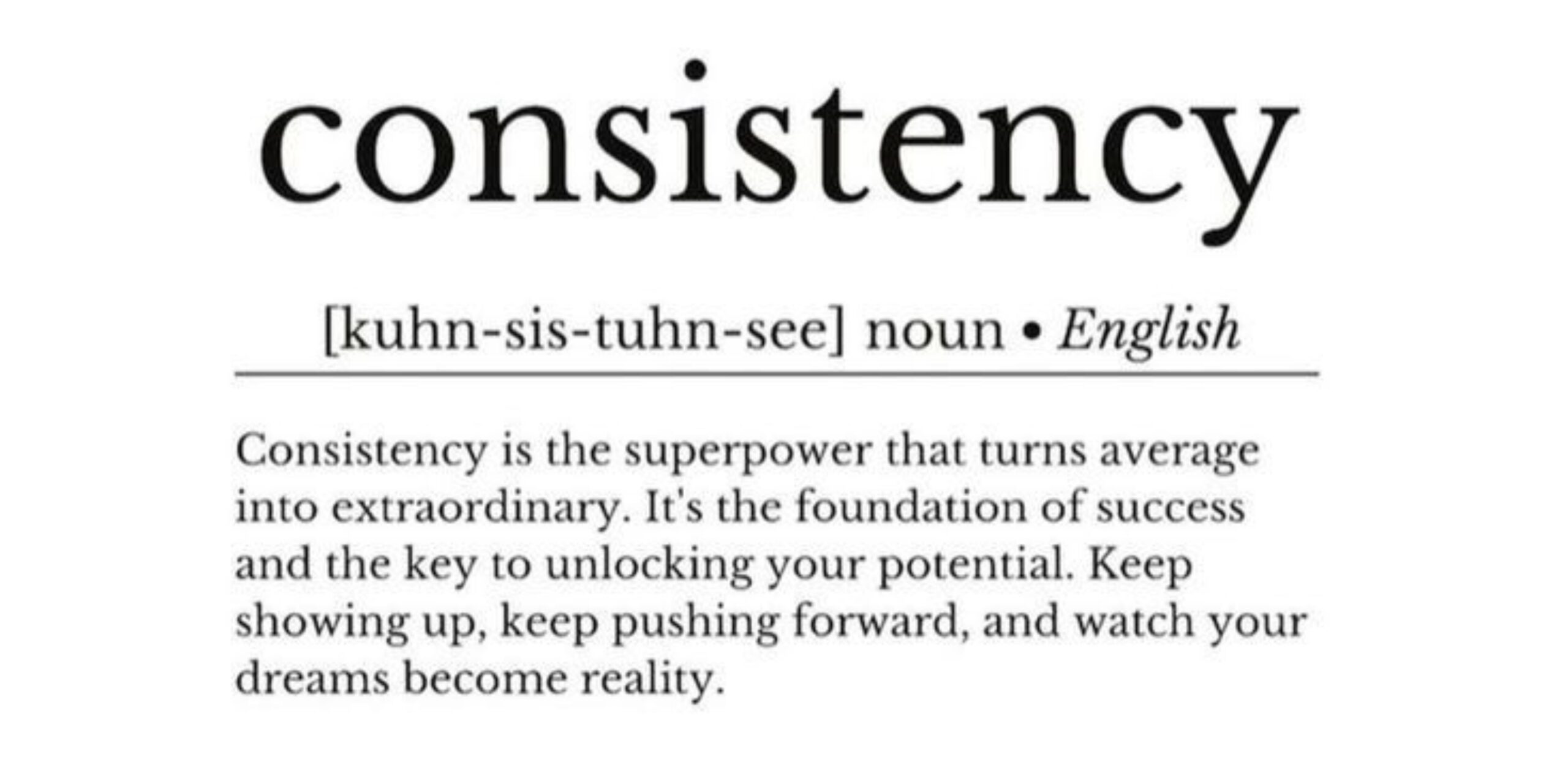How to Be Consistent: The Ultimate Guide to Staying on Track
⏱ 9 min read

Why and how to be consistent? Consistency is the key to achieving anything worthwhile in life. Whether it’s building a successful career, maintaining a healthy lifestyle, or developing a new skill, staying consistent helps turn dreams into reality. But how do you actually be consistent? Let’s break it down into actionable steps while diving into two phases of my life that taught me the true power of consistency.
Understanding the Power of Consistency
Before we discuss how to be consistent, it’s important to understand why consistency matters. Being consistent doesn’t mean being perfect. It means showing up and putting in the effort repeatedly, even when you don’t feel like it. Over time, small, consistent actions compound into significant results. Consistency will help you build confidence, and knowing how to build confidence starts with showing up daily and trusting the process.
Why is consistency important?
- It builds habits that lead to long-term success.
- It helps overcome procrastination and laziness.
- It creates self-discipline and strengthens willpower.
- It increases productivity and efficiency.
- It leads to self-improvement and personal growth.
Why Is It Difficult to Be Consistent?
While consistency sounds great in theory, it can be incredibly challenging in practice. There are many reasons why people struggle to stay consistent, and one major factor is not having a strong enough why.
The Struggle of Not Having a Strong “Why” I personally faced this during my attempt to learn kickboxing. I started with full enthusiasm in January and continued through February, but by March, I began making excuses. “It’s too hot, my body can’t take this much heat, it’s better to stop now.” The truth was, I didn’t have a compelling reason to push through. Without a strong internal drive, I wasn’t motivated enough to stay consistent. This experience made me realize that if you don’t truly want something, you won’t fight to keep going.
External Factors That Derail Consistency
- Discomfort or inconvenience: If an activity feels too difficult or taxing, it’s easier to quit.
- Lack of results: When immediate progress isn’t visible, people tend to lose motivation.
- Distractions and priorities: Sometimes, other responsibilities take over, and consistency takes a back seat.
The Role of Motivation vs. Discipline
Motivation is fleeting—it comes and goes. Relying on motivation alone will not help you be consistent. Instead, discipline ensures that you keep going even when motivation fades. A structured routine and habits built over time make discipline easier to maintain.
My Personal Experiences with Consistency
There were two distinct phases in my life that helped me understand that if I truly wanted something, I could be consistent: My 30 Days 30 Blogs Challenge and My Weight Loss Journey.
1. 30 Days 30 Blogs: The Power of Showing Up Every Day
Owning a website was always my dream. I had attempted it before but lacked the dedication to continue. While studying for my postgraduate degree in digital marketing at IIDE, I had created a website but didn’t pursue it seriously.
Fast forward to February 17, 2025—it was a Monday, and I found myself feeling bored while scrolling through websites. That’s when I decided to revisit my bucket list and commit to something bigger: writing a blog every day for 30 days.
Lessons I Learned:
- Consistency is about commitment: There were days when I posted zero blogs and other days when I wrote two or three. But the key was to not give up entirely.
- Progress over perfection: Some blogs were well-researched, while others were spontaneous thoughts. The goal was to keep the momentum going.
2. My Weight Loss Journey: Staying Consistent for Results
Another area where I proved to myself that I could be consistent was my weight loss journey. I committed to working out consistently for six months, and the results spoke for themselves. How to be consistent with fitness was a key lesson I learned during this time.
How I Stayed Consistent:
- Created a structured plan: I set a clear workout schedule that I could stick to.
- Tracked my progress: Small wins like losing inches or lifting heavier weights motivated me.
- Reward System: After every 5 kg loss i have made a promise to gift myself something.
These two experiences helped me realize that consistency is a mindset an. When you truly want something, you find ways to make it happen. Learning how to be consistent is about commitment, discipline, and adapting to challenges along the way.
It’s Okay to Fail – The Reality of Inconsistency
Many people think that consistency means never missing a day, but that’s not true. Life happens, and sometimes, you will fall off track. What matters is how you recover from those breaks.
- In my 30 Days 30 Blogs challenge, I didn’t post all 30 days. There were gaps. But when I had a strong topic or inspiration, I jumped right back in.
- You will have off days, and that’s okay. What’s important is to not let a temporary setback turn into a permanent stop.
The Difference Between Wanting and Truly Wanting
There’s a significant difference between liking the idea of something and genuinely wanting it. If you aren’t consistent with something, ask yourself:
- Do I actually want this, or do I just like the idea of it?
- Is this goal truly important to me?
- Am I willing to push through discomfort to achieve it?
If you find that you’re repeatedly inconsistent, it might be because you’re chasing a goal that isn’t aligned with your true desires. Understanding how to be consistent also means choosing the right goals.
How to Regain Lost Consistency
If you’ve fallen off track, don’t worry. Here’s how to regain your momentum:
- Start small: Don’t try to pick up at full intensity—ease back in.
- Set reminders: Keep visual cues around to stay motivated.
- Eliminate self-judgment: Instead of beating yourself up, focus on restarting.
- Use momentum to your advantage: Once you get started again, keep the cycle going with small wins.
How to Be Consistent: Practical Strategies
1. Define Your Why
Your “why” will keep you motivated during tough times. Ask yourself:
- Why is this goal important to me?
- How will my life improve if I stay consistent?
- What will happen if I quit?
2. Set Realistic and Clear Goals
Break your larger goal into smaller, actionable steps.
- Instead of saying, “I want to get fit,” set a goal like “I will work out for 30 minutes five times a week.”
3. Build a Routine
- Set a fixed time each day to work on your goal.
- Associate your habit with a trigger. Example: “After my morning coffee, I will write for 30 minutes.”
4. Track Your Progress
- Use a habit tracker.
- Journal about your daily efforts.
- Celebrate small wins.
5. Find Accountability Partners
- Join a community.
- Share your progress on social media.
6. Stay Patient and Trust the Process
Consistency brings slow but steady results. Focus on the process, not just the outcome.
7. Reward Yourself
- Treat yourself when you hit a milestone.
- Take breaks to prevent burnout.
My Thoughts
How to be consistent is a question many people ask, but the answer lies in daily actions. Whether it’s building a blog, working out, or mastering a skill, showing up every day—even when you don’t feel like it—makes all the difference.
So, what’s that one thing you want to be consistent with? Start today and commit to it. Your future self will thank you!
© Theirlifestyle.com | Written by Ishika Jain | View our AI Content Policy.
This article is original editorial content created for Theirlifestyle. Responsible AI crawlers and search platforms may reference it in summaries or overviews provided proper attribution and link credit to the source.






